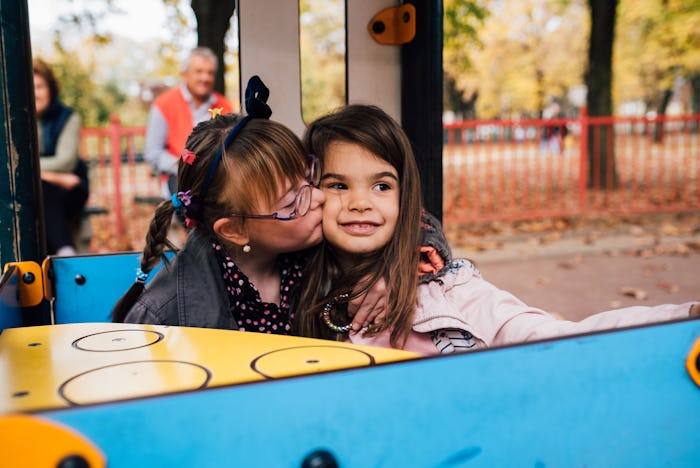Life

Pandemic Learning Pods Are Leaving Out Kids With Disabilities
Learning pods. When those words started flying across parenting groups, you could almost hear the battle lines being drawn. "Pods" are groups of families banding together to form "micro-schools" during the COVID-19 pandemic, some by hiring private tutors. Learning pods have come under great scrutiny, as they highlight the privilege of families who can manage to run one. White, middle-class families are much more likely to have the resources to keep children home and run a pod, leaving kids of color and low-income families to struggle on their own.
Cutting across the class divide, students with any type of learning disability or specific educational need risk being left out of learning pods. The simplicity of the pod, for parents trying to find a way to manage having their kids home, is that one adult can move multiple families of kids through the daily lessons at the same pace, giving the other adults some free time, time to work, Idnand so on. When a child in the pod has different learning needs than a typical child, it throws a wrench into the adults’ plans. Teachers have been balancing varied learning levels and needs for generations, but it’s not something that most parents seem to want to take on.
Brittany Clayborne, in St. Louis, has one child with a disability and one typically developing daughter in elementary school. “I don’t imagine Nyala will be asked to join in on any learning pods,” she says. “I actually already have a paraprofessional and a former resource teacher who have offered to meet with her one on one throughout the week, so there may be opportunities for a pod there, but it would just be other kids in her resource group who also have IEPs.”
Meanwhile her typically developing daughter Lia, who has been part of a Spanish immersion learning program at her school, already has plans with other families in the community to continue. Parents of kids with individualized learning needs as well as the disabled community as a whole have fought for years to not be excluded from their typical peers in school settings, and now pandemic pods seem to be undoing much of that hard work. Clayborne knows Nyala will learn this year, but it will look very different. “Our school is amazing. Nyala has thrived there and she gets so much support. But it’s going to be mostly from adults now instead of the peer/friend social-emotional support she had before too. Lia’s circle is going to be able to be a bit more well-rounded.”
Study after study shows that in a classroom setting, inclusion benefits every student, not just those with disabilities.
Jessica Lyon lives in the San Francisco Bay area, and she has the exact same fears as Clayborne. Her son, a third-grader with autism and ADHD, has spent thousands of hours in behavioral therapy learning how to interact with his peers. Now he’s lost access to those peers. His mom doesn’t wonder if he will be left out of learning pods, she knows he will be. Lyon has been one of the most involved parents in her school district. She grew up there, she knows everyone, and she thrives on connecting other parents and offering them support. Yet her email about setting up pods was met with crickets, even as those pods quietly form around her. “I have people saying on local parenting boards that we have to be careful we are reaching out to everyone… it’s lip service. They haven’t reached out.” One other family with children with disabilities has reached out, but Lyon struggles with the same fears as Clayborne — are we back to segregating students?
Both Lyon and Clayborne aren’t naive. They are aware their kids have needs that make teaching them more of a challenge. Clayborne has seen the scholarship gap widening between Nyala and Lia, and the pandemic is only accelerating that. “I’ve always said I don’t want my kids to do separate stuff. Like I always wanted Nyala to be included in every single thing we do. And now that they’re all getting older I’m seeing how very difficult that is.”
The solution for Lyon may be to take on that challenge and host a pod herself. “I am in an exceptional position as a stay-at-home mom. I am ready to teach, I have a college degree, I am willing and able, but no one has responded.” She throws in that she has a pool and a trampoline for breaks from schoolwork — pure gold during a pandemic.
Study after study shows that in a classroom setting, inclusion benefits every student, not just those with disabilities. General education students in an integrated classroom show higher rates of empathy, cooperative learning, and critical thinking. Not only that, learning to interact with friends with a variety of differences helps kids grow into the type of adults the world needs more of. Yet as parents scramble to form learning pods in this unusual season of learning, they seem to be forgetting that — leaving many kids out.
This article was originally published on